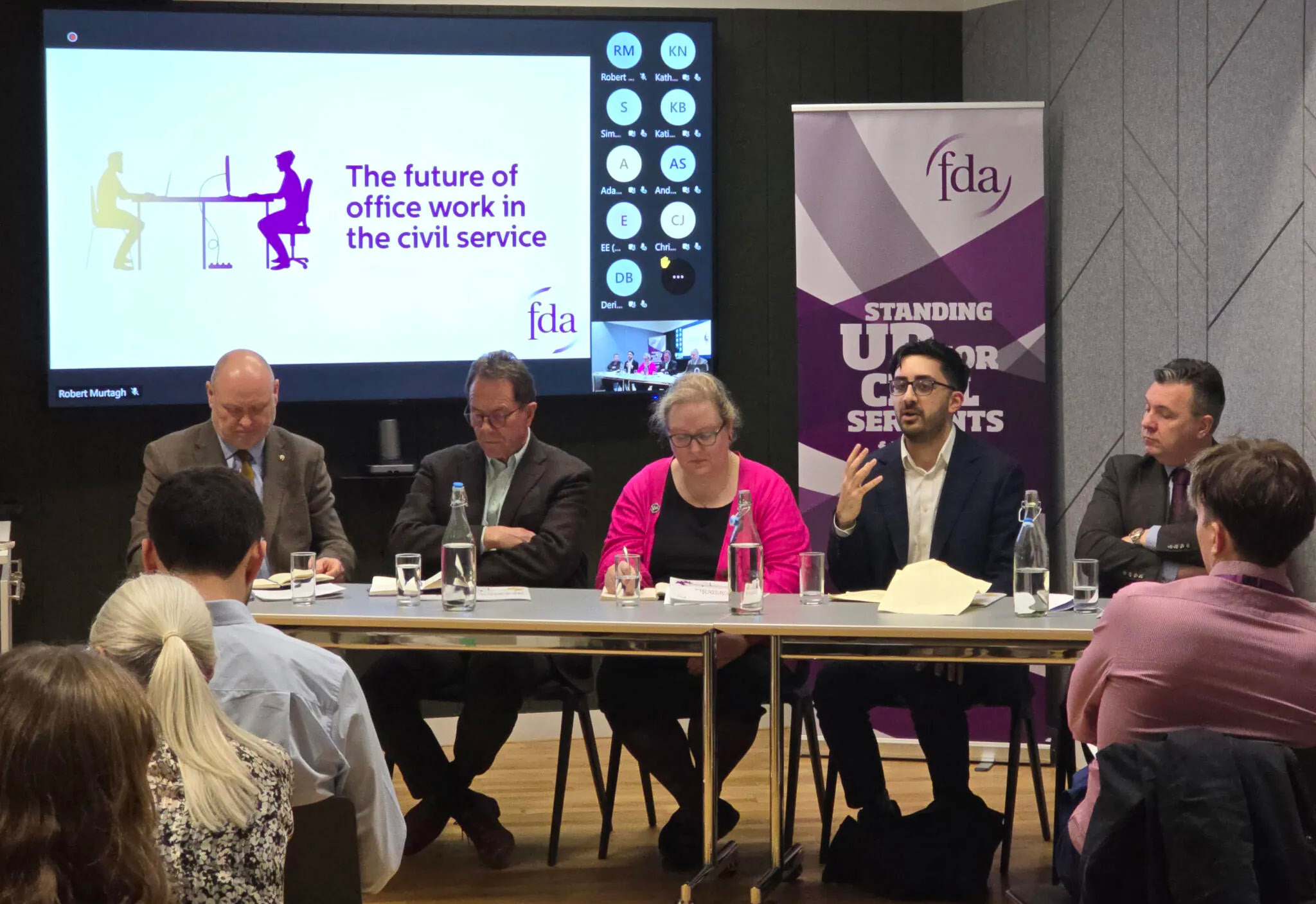Hybrid working: Led by evidence, not headlines
8 Apr 2025 01:44 PM
Tom Nathan shares the findings and recommendations of the FDA’s recent report on ‘The future of office working in the civil service’.

The panel at the report launch event (from left to right): Dave Penman; Peter Cheese; Margaret Haig; Sufyan Ahmed; and Paul Malone.
Civil servants have often been left frustrated by debates around office working in government departments. The issue has become politicised and is used to attack the work of the civil service, despite a lack of evidence and a detachment from the realities of civil servants’ working lives.
The FDA continues to challenges these unfair criticisms in the media, having made the case with successive governments that blanket, one-size-fits-all office attendance mandates are not an effective way of running a large and complex organisation such as the UK civil service.
In February, the FDA published a new report to move this discussion beyond the false dichotomy between productivity and office attendance, and to begin promoting purposeful office work.
‘The future of office working in the civil service’ is based on a survey of more than 7,000 FDA members, the highest response rate of any previous FDA survey. The results found that the UK government’s 60% office attendance mandate has failed to deliver on any of its own objectives.
The mandate aimed to improve collaboration and innovation, in addition to helping young workers at the beginning of their careers. However, the survey revealed that 61% respondents of those working under the 60% rule believe the mandate has decreased their productivity. 61% also reported no improvement in team collaboration due to the mandate – with members often spending the increased time in the office in virtual meetings and citing the lack of desk space. As one member put it: “Lack of available desk space means a large majority of staff cannot sit with their team members therefore the argument of being together with team members to collaborate falls down.”
The survey also provides no evidence that the mandate has benefited young workers. According to our survey, a significant 77.5% of Fast Streamers believe the mandate has not been beneficial. The only group showing notable support for the mandate were SCS workers, even then with just 30% expressing a positive view – this is still a long way off a majority.
There is also a strong scepticism among line managers that this policy has ‘managerial benefits.’ Our survey received more than 3,600 responses from employees who are line managers working under the 60% mandate – half of all respondents. 72% believe that greater office attendance has not enhanced their management responsibility and 62% believe the mandate is misaligned with the needs of their team.
This report also looked beyond the 60% mandate applied to UK government departments. The report considered the different approaches taken by devolved administrations. The Scottish Government, Welsh Government, and the Northern Ireland Civil Service have each opted not to implement a 60% office attendance mandate.
‘The future of office work in the civil service’ also looked at the integration of artificial intelligence (AI) in the civil service. Successive governments have placed hope in the potential advantages that the rapid advancement of AI holds for the performance of public services. AI promises the potential to be used to support employees by automating repetitive tasks such as data entry, email composing, speech writing, diary scheduling, managing customer inquiries, and analysis of large volumes of information. Consequentially, the future of office work with the utilisation of AI could be one area in which office work is purposeful, featuring genuine face-to-face interactions that enhance productivity and make the office a more appealing and engaging place to work.
The survey found that despite a willingness to engage with these technologies (76% of respondents are keen to gain skills in AI), their adoption remains limited, with 72% of survey respondents indicating no interaction with AI tools in the workplace.
Click here for the full press release